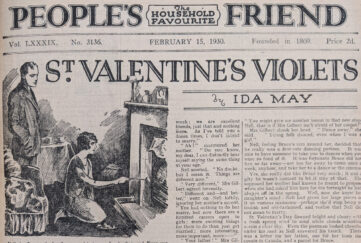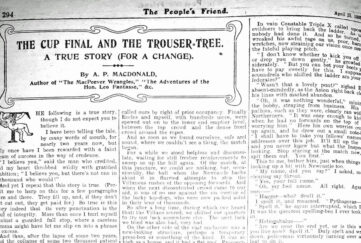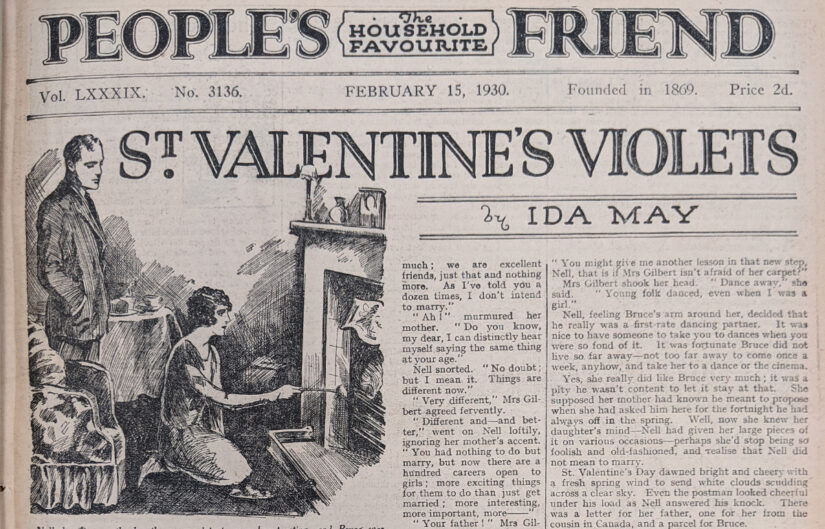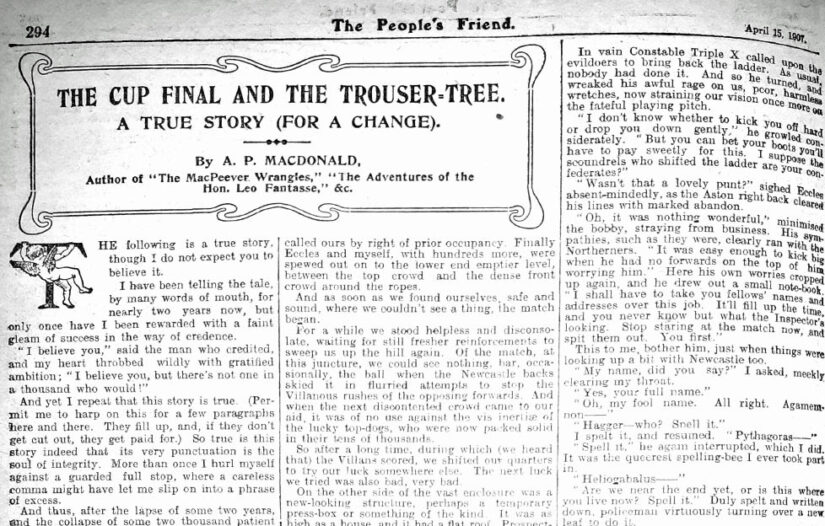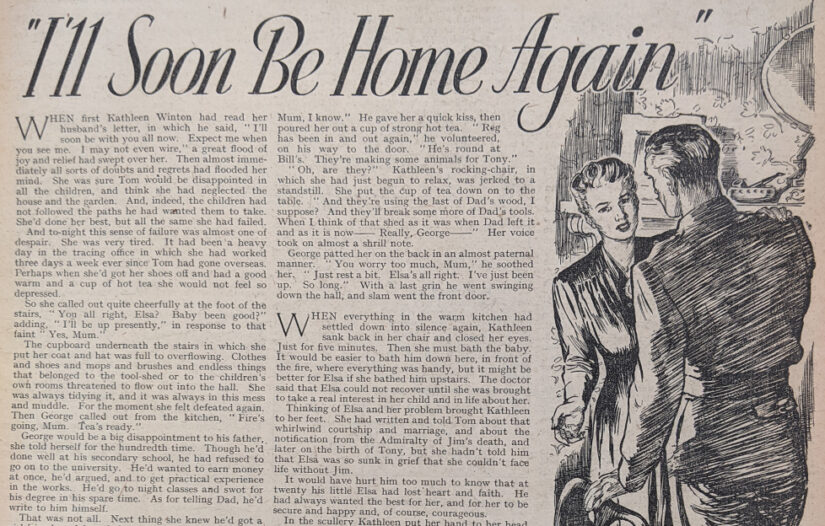Reading Between The Lines S3EP02: “The Film Star And Her Double”
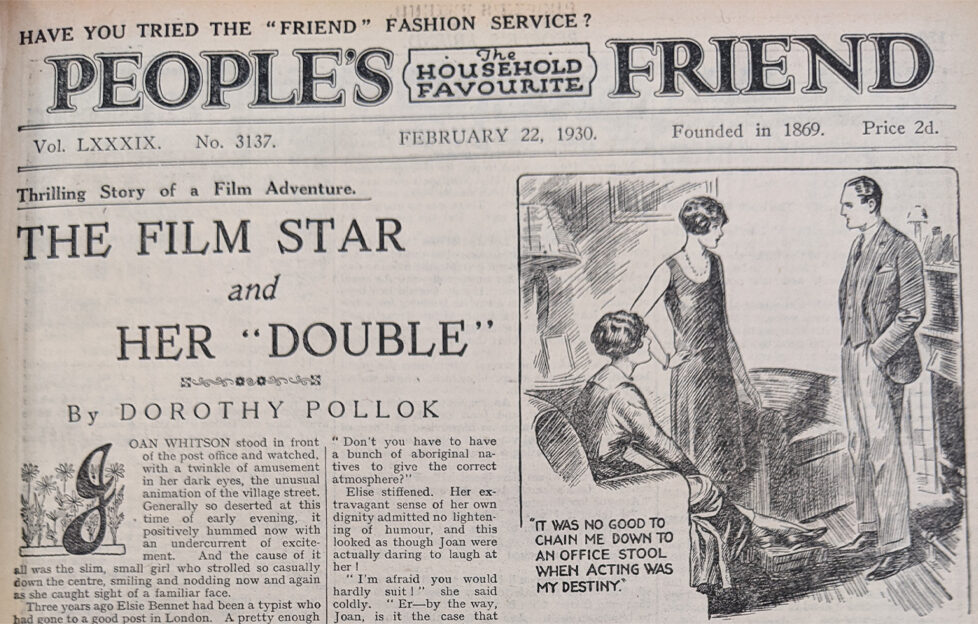
This is the second episode of season 3 of Reading Between The Lines. This episode we’re reading The Film Star And Her Double, first published on February 22, 1930. You can read along with the story as you listen to the episode and what the team thought of it.
Joan Whitson stood in front of the post office and watched, with a twinkle of amusement in her dark eyes, the unusual animation of the village street. Generally so deserted at this time of early evening, it positively hummed now with an undercurrent of excitement. And the cause of it all was the slim, small girl who strolled so casually down the centre, smiling and nodding now and again as she caught sight of a familiar face.
Three years ago Elsie Bennet had been a typist who had gone to a good post in London. A pretty enough girl, certainly, but simply Elsie Bennet, daughter of old Joe Bennet, of no particular claim to fame. Now she was back, no longer Elsie Bennet, but Elise Benet, film star—Elise Benet, whose features were threatening to become as popular as those of Gloria Swanson or the Talmadge sisters. No wonder the village stared!
She came sauntering on slowly, savouring to the full the glory, the admiration, that was hers. In London, Elise was certainly regarded as a coming name, but in London, after all, there is a plethora of pretty girls and famous people. Here, in this quiet village where she had been born, she was creating a sensation which was a balm to her questing heart. Elise loved power, she loved admiration, and it was here at her feet.
“Joan! Joan Whitson! How—how nice to see you.” Elise stopped as she reached the girl by the post office and held out her hand. “I do hope you haven’t forgotten me already?”
Joan laughed, taking the slim hand in its pale-coloured glove into her own sunburned palm.
“Of course not—how could I? Besides, aren’t you the village prodigy of whom we are all so proud? But I’m awfully glad to see you again. Are you staying long?”
“I’m not quite sure.” Elise looked critically at the girl before her. She reflected complacently that Joan, who had never been a beauty, had become even plainer in the past three years. Elise remembered that once she had actually envied this girl, not for her looks, but for her assured position. Now the tables were turned—with a vengeance!
“I hope you’ll stay long enough to come and see us,” Joan went on cordially, her eyes upon the lovely face on a level with her own. “Won’t you come and spend an evening?”
“Thanks. I’d like to—if I have time, but,” she lowered her voice impressively, “but I may not. You see, I’m really here to do part of my next big picture. One of the scenes is to be shot here. My director is coming up tomorrow, and after he has had a look round, the rest of the cast and the staff will come, too. Marvellous chance, isn’t it, for a quaint little place like this!”
Elise’s voice expressed ineffable condescension, and the twinkle returned to Joan’s eyes. Only three years away and already her native place was “quaint”.
“I don’t suppose you could push me into one of your ‘crowd’ scenes?” Joan suggested laughingly. “Don’t you have to have a bunch of aboriginal natives to give the correct atmosphere?”
Elise stiffened. Her extravagant sense of her own dignity admitted no lightening of humour, and this looked as though Joan were actually daring to laugh at her.
“I’m afraid you would hardly suit!” she said coldly. “Er—by the way, Joan, is it the case that you’ve taken my old post in Graeme’s? Typing, I mean?”
“Quite true,” answered Joan quietly. “Since daddy died I have to earn my living, and Mr Graeme has been very kind to me. I live with my aunt now.”
“How I loathed those dry, legal things!” Elise sighed at the bare recollection. “But then, you probably love it, don’t you. You don’t long as I did, for the bigger world.”
Joan shrugged faintly, but let the statement pass unchallenged. Elise had always been given to little affectations, and time had not changed her in this one respect, at least.
“I’m afraid I shall have to hurry on, Elise.” Conscious of a vague feeling of dislike which was growing up in her mind, Joan strove to make her voice cordial. “We have supper early. You’ll phone me, won’t you, if you find you’ve an hour to spare any time?”
Joan found herself clasping Elise’s beautifully-gloved hand somewhere high up in mid-air, and they parted, Joan to walk with unnecessary swiftness towards home.
She was astonished to find that the vague dislike threatened to become concrete, and that speedily. Joan reasoned with herself. She was not, as a rule, given to prejudice, but a faint, intangible patronage in the other girl’s manner had definitely ruffled her. Elsie Bennet to patronise her! Of course, Elsie was very lovely. Joan, catching sight of her own reflection in a passing window, grimaced slightly. What a contrast! That there might be something very attractive in her own frank gaze and her jolly laugh Joan never even considered. She was not pretty and she accepted the fact without a grumble. Only, Elsie, somehow, seemed to bring the matter home to her very strongly.
“Hello, Joan! Why this spanking pace?”
A tall young man overtook her, and Donald Graeme, son of old Mr Graeme, lawyer and banker, fell into stride by her side.
“Is your conscience chasing you?”
Joan smiled up at him.
“I believe it is!” she laughed. “And, Donald, I do wish you’d get into the habit of calling me ‘Miss Whitson’. You know, it doesn’t do to call me ‘Joan’ in the office, and you’re always forgetting.”
“Sorry!” Graeme looked, nevertheless, quite unrepentant. “But since I’ve called you ‘Joan’ for twenty-three years, it’s a bit difficult to start ‘Miss Whitson’ now. By the way, what about the Rugby dance next week? You’re come with me as usual, aren’t you?”
Joan nodded acquiescence. For the last five years she had gone to this dance as Donald’s partner, just as they went to all the other village functions. They might almost have been an exceptionally friendly brother and sister, and Miss Whitson, Joan’s aunt, who with old Mr Graeme had hoped for some nearer relationship to develop between the young folks, had been obliged to admit that nothing seemed more unlikely—at least in the meantime.
They swung along together in the silence of friendship until the man stopped at a corner.
“I’m going down to Mason’s. Look here, I’ll bring round that book tonight. I may be a bit late though. Will it matter?”
“Not a bit. We’re not doing anything special this evening, anyhow.”
Joan quickened her pace again when she was alone and turned up the road which led her home. Then she stopped in astonishment. In front of her, walking slowly, was Elise Benet.
Elise turned at the sound of footsteps and smiled at Joan.
“Are you thinking I’ve got the seven-leagued boots?” she laughed. “I cut through Back Lane to try and catch you! I was wondering—I suddenly remembered that I’m at a loose end tonight, and I wondered if I might accept your invitation and come to see you this evening?”
“Why, of course, Elise!” Joan succeeded in infusing a warmth into her voice that she knew she was far from feeling. “Won’t you come now and have supper with us?”
She introduced the visitor to Miss Whitson and bit back a smile at the old lady’s frigid reception. Miss Whitson regarded the actress much in the same way as she regarded criminals—with suspicion, and all Elise Benet’s airs and graces were powerless to charm her. To Joan it was a positive relief when, later in the evening, they were joined by Donald Graeme. Donald was first favourite with the old lady and she thawed visibly.
So, too, did Elise. She dropped most of her artificiality and began to laugh over reminiscences of old times with him.
“Do you still begin those dreadful documents: ‘Whereas the so-and-so?’ How I used to hate them! I still dream of the old days when I’m having nightmares!”
“Oh, come now!” Donald, his fair head thrown back in protesting laughter, admiration in his usually so serious eyes, turned to Joan. “Tell her we aren’t all hoodoos, Joan! Stick up for me!”
Elise shook her short curls.
“You weren’t bad at all! The work was. Don’t you hate it, Jo?”
“No,” said Joan honestly. “I believe I rather like it.”
“But then, you’re one of the lucky ones!” Elise sighed wistfully. “I happen to be cursed with the artistic temperament, and it’s not a happy possession!”
“Then why cultivate it?” interposed Miss Whitson rather caustically in her deep voice. “Why?”
“Because I can’t help it. One has to do the things one is born for. It was no good to chain me down to an office stool when acting was my destiny! Though how I tried to avoid it!”
Miss Whitson emitted a sound rather like a snort, but Donald Graeme looked at the girl with new interest in his eyes.
“Somehow, I never thought of you as being a square peg in a round hole,” he said thoughtfully. “’Pon my word, it was jolly plucky of you grinding away all those years with us as you did!”
Elise smiled at him gratefully and let her big eyes rest upon his.
“I always remember how kind you were to me!” she said softly. “I could never forget that.”
Joan, watching, felt a sudden inexplicable pang shoot through her. Was it possible that she was jealous? The idea was inconceivable, but Joan knew that the evening with Donald, which should have been so pleasant, was proving a failure to her. She was outside all this conversation between the other two. Shut out, it almost seemed deliberately, by Elise’s cleverly-timed flood of reminiscent chatter.
Elise was talking of the old days. She asked about the Rugby dance. Was it still held? How she had always loved to go! Donald swallowed the bait with alacrity.
“Then what about coming to it next week? I’m taking Joan, of course, and if you like I’ll get another man and we can make up a party. You’d like that too, Joan, wouldn’t you?”
“Love it!” fibbed Joan gallantly. One had no option but to say those polite untruths. “Do come, Elise!”
Elise agreed gracefully. She rose to go and Donald followed suit in order to see her home. Joan saw them off and returned to the sitting-room where her aunt was putting up the disordered cards.
“She’s deep and she’s clever,” commented the old lady briefly. “And she’s flattering Donald until he’s almost blinded by it. Men are like children, but I thought Donald Graeme had his head screwed on better than most! But a pretty face and a flowery tongue and there you are! Thought she hasn’t done serious damage yet. Now get to bed, Joan; you look tired.”
Sleep was long in coming to Joan that night, and when it came, illumination had come before it. Joan knew now what that ache at her heart meant. It was jealousy—not of Donald as a brother, but as the man she loved.
The Rugby dance came round in due course and they went as a party of four. Donald was as attentive as ever to Joan. He talked to her as of old, telling her all the little difficulties he had been wont to confide in her and adding to the list his opinion of Elise Benet.
“So unspoiled,” he said seriously, “and such a deep nature. She tells me . . .” He held forth at considerably length, and Joan smiled with stiff lips and gallantly hid the writhing pain at her heart. Donald was not actually in love with Elise—yet. But Elise meant to have him, and Joan shivered. The only comfort she got out of the evening was the casual remark of Elise that her director was coming the following day and she expected to begin work soon.
Two days later a happening arose, so sudden and so overwhelming, that Joan actually forgot all about her own and Elise’s affairs together.
Miss Whitson turned ill. The doctor saw her. He said little, but returned the next day and murmured words about a specialist from Glasgow. A great man came from town, and within the next twenty-four hours Miss Whitson was in a Glasgow nursing home ready to undergo a serious operation and Joan had returned to the village alone.
Dazed at first, she sat in a deserted house. They had sent her back, telling her it was better so, and that if necessary they would telephone through for her. Joan sat very still trying to think. And then the burden of her thoughts was—money.
Money. How was she to pay for this operation—for the nursing home? Miss Whitson’s own income was pitifully small and Joan’s salary was swallowed up in household expenses. There was no margin left for emergencies of this sort. But the money must be found somehow.
A gleam of sunlight flickered across the floor and reminded Joan of the fresh air. She put on her hat and went out. She was not going to the office today—Mr Graeme had told her to stay off—and she could think better out-of-doors. If only Donald had been at home! But he was away on business for a few days. Joan thought longingly of his strength and kindness. “Only,” she thought, “I couldn’t very well have asked him about the money. It wouldn’t have done.”
She had walked for several miles when she found herself nearing the deep, blue loch, whose waters swept in from the Firth.
“Stop, please!” An imperative voice caused her to start sharply, and Joan looked up to see a small man standing upon an improvised platform of rough logs. “Would you mind going round another way? We’re shooting a scene here and everything is all set.”
“Oh, is this where Miss Benet is?” Faint interest brought Joan’s mind back to everyday events. “Are you her director?”
“I thought I was!” returned the man shortly. “But it doesn’t seem to mean much to her! Look here. Are you a native of this place?”
“Yes,” Joan looked at him in astonishment. “Yes; why?”
“Then perhaps you’ll be able to tell me definitely whether or not it’s safe to swim across the loch from that crag there. Miss Benet says it’s not and refuses to budge an inch. And so we’re all here, with expenses mounting hand over fist. It’s enough to—” The end of the sentence was lost in his pipe, but his expression was clear enough.
Joan looked at the loch. She had swum it herself many a time, but not when its waters were swollen by the influx of so much fresh water from the hills. One or two of the burns were running as strongly as rivers.
“I’m afraid it might be dangerous,” she said slowly. “The Bracken Burn is always strong, and just now it’s running like a river.”
“But if we had a boat just outside the range of the camera,” protested the man eagerly, “wouldn’t that be safe enough? We’d be able to reach her in a couple of minutes if she needed help. But she won’t hear of it, and nobody knows when it will be quiet enough for her. I tell you, what with expenses of the whole outfit mounting, I’d give fifty pounds to anyone who’d do the job for her!”
“But how could they?”
“How? Because her face needn’t be seen until she reaches the other side, and then Elise’d be ready to take over. All we want is someone with the same kind of figure. Look here.” He eyed her with sudden interest. “Would you do it? I’d give you a cheque for fifty pounds the minute you landed—and we’d follow you the whole way with a boat, so there’d be no risk!”
Joan gasped. Fifty pounds! The money for Aunt Mary’s operation! But suppose she really did take cramp or something—
“I’ll make it seventy if you take it on!” The man was watching her expression keenly. “And you’ll be as safe as can be.”
“I’ll do it!” said Joan abruptly. “When do you want me start?”
“Good girl! That’s right! Better just do it now when you’re on the spot. Elise’ll give you the costume for the part. And listen, now, here’s what you are supposed to be doing.” He walked towards a hut with her, explaining all the time. “Remember that your lover will be caught if you don’t reach the other side in time. You’ve just got to make it! And if you can manage to express that with your actions, then that’s all that’s wanted. I’ll direct you through the megaphone and tell you when to falter—just about the middle—and act exhausted at the end.” They had reached the hut and rapped on the door. “Here, Elise, here’s someone who will double for you in the swim. Get her into the togs, please, quick!”
Elise Benet looked at Joan, pique struggling with amusement in her eyes.
“You, Joan! Of all people! Oh, all right then!” She shrugged, closed the door and proceeded to show Joan the clothes. “Though why he should choose you to double for me—”
Joan ignored the spiteful implication.
“Our figures are alike,” she said coolly, and robed herself as rapidly as she could. “I’m ready now!”
The director was awaiting them outside. He looked nervous and relieved when Joan appeared.
“Ready? That’s fine. Then remember your instructions. Now, Micky, begin to shoot when she reaches the crag.”
Joan climbed up the high crag which jutted out into the loch. Seen from above, the waters were a steely grey. Just for an instant her courage wavered. Suppose—
“Ready! Go!”
The command sent Joan’s arms up automatically and her slim body show like an arrow through the air.
Oh, it was cold! Joan rose to the surface, gasping painfully.
“Carry on! Straight across!
The shout reached her dizzying brain and steadied it. Right—she would carry on. After the first few strokes it was not so bad. There was even a faint warmth upon her head and neck from the sun which struggled overhead. Joan swam strongly, her white arms rising and falling with the precision of a machine. After all, why had she been frightened? It was easier than she had expected.
It seemed a long time, though, before the command to falter and show signs of weakness came to her. Obediently, Joan allowed her stroke to slacken and felt a surge of chill creep over her as she floated motionless for a few seconds. Was it really possible, she asked herself, puzzled, that after all this time she was only half-way across? She tried to look ahead. Yes, she was no more than half-way, but she was not now heading for the point towards which she had started. Joan frowned and looked behind her. The crag from which she had dived seemed to have moved some distance up the bank! It was stupid to have lost her direction like this! Joan swam with renewed vigour, striving to make up some of the leeway.
There were no shouted messages reaching her now, Joan supposed she was too far out. She swam on mechanically for some minutes before once again she glanced behind her for the crag. And then it was that sheer, stark fear gripped her. She had not made up the leeway. Instead, the crag had receded still further north!
The Bracken Burn! Its swollen current must be bearing her off her course! Joan relaxed her efforts for a moment and watched herself being borne downwards. She struggled frantically to pull against the current, but though she succeeded in making headway towards the other side, yet still the force of the fresh water drove her southwards.
Joan began to feel tired. The icy water was making her limbs heavy with cold. She could not fight her way across against this river. It seemed as though it would pull her the whole length of the loch before she could reach the opposite shore. To fall meant losing the money, but go on meant—almost certainly—losing consciousness through exhaustion and chill. She decided to give in and signal the boat.
Joan raised an arm which had grown dreadfully heavy with fatigue. She waved and waited, expecting to hear the chug, chug of a motor. But only silence. Again she waved, and this time looked towards the crag from which she had dived. But in all the length and breadth of the loch there was no sign whatever of a boat!
No boat! That meant no help. There was nothing for it now but to go forward. To go back would be worse. Joan judged that she must be two-thirds through the current by now. She must fight to the last breath in her body! The cold was numbing her now. She pushed on mechanically. One—two—three—four. Would she ever reach the bank? How could that man have broken his word about the boat? And why had she allowed the excitement to prevent her from noticing its absence at the start?
Joan found herself laughing a funny, cracked laugh when she thought of Elise. How would she feel when told that her double was dead? And Donald Graeme? Would he feel sorry, or only thankful that it was Joan and not Elise?
She gave up swimming and began to float. She was too tired to bother any further and she would just drift for a few moments.
Then suddenly, out of nowhere, came the thought of Aunt Mary. If Joan died, what would become of her? Would this man pay the seventy pounds? But, of course, he wouldn’t! And how would Aunt Mary live on her small income?
Desperation sent a surge of new strength through Joan the thought. She simply daren’t drown! She must get through! She must! Little black specks began to float before her eyes. There was a pain at her side like a red-hot iron each time she breathed.
“Hi! Hi! Look out for that rock!”
Weakly Joan opened her eyes and saw a rock jutting out of the water in front of her. She clung to it, feeling cautiously for a foothold.
“That’s right! Only another few yards. Now, don’t collapse yet; remember how much depends upon you!”
Feebly Joan achieved another few strokes, found her feet touch a pebbly bottom. So much depended upon her. Aunt Mary—the money—
She staggered into shallower water and felt someone catch hold of her and lift her bodily. Someone wrapped a furry coat around her and she was carried into the warmth of a closed motor car.
“Now, drink this!” A voice—it seemed absurdly like Donald Graeme’s—spoke peremptorily, and, finding it too much trouble to refuse, Joan swallowed obediently.
“Now, Miss Benet, get those wet things off her and get her into something dry!”
The hot liquid sent a welcome warmth through Joan’s chilled limbs and she opened her eyes to see Elise Benet holding out her dry clothes. Elise looked white and shaken, but Joan was too tired, still, to bother. She managed to struggle out of her soaked garments with Elise’s help and got into the others. Then it was that the first voice came back and spoke again.
“Now, Joan, drink a little more!”
This time consciousness came back fully. Joan looked up into the worried eyes of Donald Graeme as he held a flask to her lips.
“Donald, how did you get here?”
“I was on my way home when I saw you staggering into shallow water. I just got to you were when you were falling. Oh, Joan, darling, how could you do such a reckless thing! You might have been drowned! Had you forgotten the danger?”
“I—the man said there’d be a boat near; and I needed the money for Aunt Mary!”
“Why didn’t you come to me? You knew I’d have given you every penny I had in the world! You might have been drowned!” The arm about her shoulder tightened. “There was no boat on the loch and the director says he hadn’t realised that until you had started. I’ve told him exactly what I consider him!” Donald’s voice was grim. “Oh, darling, I never realised just what you meant to me until that awful moment! Joan, Joan, say you will marry me—and do not do those reckless things again!”
“I suppose,” said Joan weakly, “that—that I won’t have time!”
*
It was a very sheepish director who came to give Joan her cheque and to make his apologies. But he bubbled into enthusiasm over the end.
“It was perfect! You’re a born actress! Why, I could see you just feel that you simply daren’t give up and let yourself drown. It was the best acting I’ve seen in my life! If you’ll take a contract—”
“Miss Whitson is getting married almost immediately!” Donald Graeme answered for Joan as the little car moved slowly forward. He did not hear a gasp from Elise Benet who stood by the director’s side. “And, as for acting, it was not acting on her part. You can keep contracts for people whose lives aren’t worth so much! My wife can’t be spared!”
There was a smile on Joan’s face as the car moved off. Contract? What did anything matter now that she had her man!
Read previous stories and updates from the podcast.



